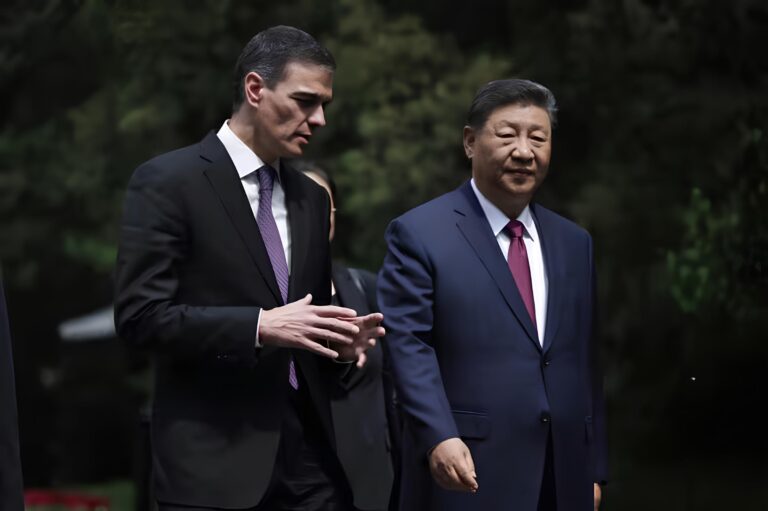🎧 Listen to This Article
In the latest chapter of the ongoing trade war between China and the United States, Beijing has announced it is raising tariffs on U.S. imports to an unprecedented 125 percent, marking its third retaliation in an escalating economic standoff. The move follows the Trump administration’s recent announcement that tariffs on Chinese goods in the U.S. had climbed to 145 percent, igniting tensions further.
The Chinese government wasted no time in responding, officially introducing these new tariffs on Friday, with a symbolic statement from the State Council. The announcement included a pointed critique of President Trump’s tariff policies, dismissing them as “a joke” and further heightening the rhetoric between the two global powers.
Retaliation in the Escalating Trade War
The latest round of tariffs comes after a series of aggressive tariff hikes between the two countries. Throughout April, the U.S. had progressively ramped up its tariff rates on Chinese goods, with President Trump taking aim at a wide range of products. By April 9, tariffs on Chinese imports had reached 145%, setting the stage for China’s sharp counteraction.
Despite initial restraint in responding with heavy tariffs, China has matched the White House’s measures. For the past few weeks, the situation has evolved into a high-stakes game of one-upmanship, with both countries continually increasing tariffs on each other’s imports. The U.S. tariffs include levies on cars, steel, aluminum, and various other goods, which have hit both industries hard.
China’s new 125% tariffs affect a broad array of American goods, further choking bilateral trade that has long been a backbone of the global economy. The move has already forced companies and industries to reconsider their supply chains, with many scrambling to adjust to the uncertainty caused by this tit-for-tat exchange.
A Mocking Response from Beijing
In a pointed move, China’s Ministry of Commerce mocked the Trump administration’s trade policies, claiming they lacked economic relevance and were “a numbers game with no practical significance.” The Chinese government also emphasized that the approach had become a “joke,” signaling the growing frustration on the part of Beijing.
President Xi Jinping, speaking publicly for the first time since the escalation, warned that “there are no winners in a tariff war,” adding that “going against the world will only result in self-isolation.” His comments were made during a meeting with Spain’s Prime Minister Pedro Sánchez, as Europe’s concerns about China’s trade practices also simmered in the background.
Impact on U.S.-China Economic Relations
The sharp escalation marks a dramatic shift in the trade dynamics between the U.S. and China. For years, both countries benefitted from a symbiotic trade relationship, with China providing affordable goods for American consumers, while American businesses accessed a massive Chinese consumer market. However, the balance has tipped in recent years, with the U.S. highlighting its growing trade deficit with China and President Trump’s insistence on reducing China’s technological and economic influence.
China, under Xi’s leadership, has gradually moved away from reliance on U.S. technology, instead focusing on domestic innovation and expanding state subsidies in key sectors. The growing rift has placed American companies in a difficult position, with many businesses facing higher costs, reduced market access, and an uncertain future.
The Road Ahead: Escalation or Negotiation?
The latest tariff hikes are now threatening to reach absurd levels, with the potential to disrupt global supply chains and markets even further. Analysts suggest that the situation could escalate to a point where the two superpowers will have no choice but to engage in serious negotiations, with both sides nearing the threshold of what is considered “preposterous” levels of tariffs.
Wang Xiangwei, a prominent Chinese affairs expert, speculates that meaningful talks will likely only begin after the tariffs have been pushed to the breaking point. As he put it, “The only way forward may be serious talks once both sides reach the preposterous level of tariffs.”
The Global Impact of Trade War Escalation
As the U.S.-China trade war intensifies, its ripple effects are being felt across the globe. Markets are in turmoil, with international trade routes disrupted, and businesses struggling to navigate the shifting landscape of tariffs and trade barriers. Economists warn that continued escalation could have far-reaching effects on global supply chains and economic growth, particularly in the developing world.
Despite the chaos, both the U.S. and China appear to be dug in for a long, drawn-out confrontation. The outcome of this trade war is uncertain, and the stakes have never been higher for businesses, governments, and consumers alike.
For further details, clarification, contributions, or any concerns regarding this article, please contact us at editorial@tax.news. We value your feedback and are committed to providing accurate and timely information. Please note that our privacy policy will handle all inquiries



